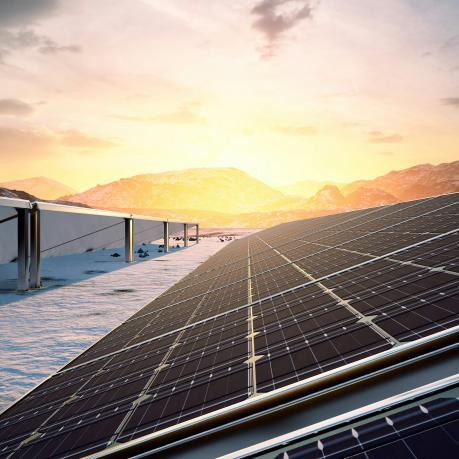
From ambition to implementation: delivering the energy transition and industrial transformation in 2026
Insight by Sandra Ghosh, Susanne Lein
News publ. 24. Jun 2021

Water security in a changing world needs sustainable solutions. The Water Dialogues for Results want to enable informed decision-making and accelerate cross-sectoral implementation of SDG 6. adelphi research co-organised a Science & Research Forum to prepare for the High-Level Conference on July 1.
Sustainable Development Goal (SDG) 6, “clean water and sanitation for all”, is not on track. There are still billions of people who do not have access to safe drinking water or sanitation services. As the mid-term review of the UN Water Action Decade 2018-2028 approaches, the Federal Ministry for the Environment, Nature Conservation and Nuclear Safety (BMU) started the “Water Dialogues for Results” to accelerate the cross-sectoral implementation of SDG 6-related measures. The Dialogues will culminate in a High-Level Conference in Bonn on 1 July 2021. In preparation for this conference, the BMU hosted several regional and thematic events, among them the Science & Research Forum, co-hosted with the Federal Ministry for Education and Research (BMBF) and UNESCO, which adelphi research helped organise. The Forum’s Outcome Document will serve as a basis for discussion at the High-Level Conference and offer valuable input to the ministerial representatives of various UN member states from the global North and South, as well as of other international organisations, who will address the needs and priorities in the water sector.
The Science & Research Forum took place as an online event on 18 May 2021. adelphi research co-organized the event on behalf of the BMBF research programme “Water as a Global Resource (GRoW)”. The event showcased latest scientific advancements from GRoW and the UNESCO World Water Assessment Programme in providing improved data and innovations to assess water scarcity and analyse SDG interlinkages. AGRHYMET, the World Meteorological Organisation, and the International Energy Agency provided insights on current practice in delivering water-related data and information services for cross-sectoral decision making. The Forum aimed to discuss the main knowledge gaps that still remain in achieving SDG 6. Moreover, speakers highlighted interlinkages with other SDGs and reflected on mechanisms required to successfully feed science inputs into decision-making.
Science and technology have made significant advances in developing new methods for data collection and processing. For example, seasonal forecasts on hydrometeorological extreme events remarkably improved in both temporal and spatial accuracy, and drones with innovative combinations of sensors can now collect detailed data on the state of water even in remote areas. However, once collected, data is often not systematically utilized. Information from various sectors and sources needs to be quality-checked and integrated according to existing needs. The (cost-saving) benefits of science-based decisions should be increasingly highlighted to encourage better use of data and help ensure funding for the collection of required data.
Another major challenge when it comes to making use of data is the implementation of participatory approaches and cross-sectoral coordination. While those approaches exist, they are often not put into practice due to fragmented governance frameworks. Here, social sciences can provide a better understanding of stakeholder networks and governance systems. Such an inter- and transdisciplinary approach can help bring together science, policy and local implementation, and provide a holistic perspective on the connections between different SDGs.
While the interlinked nature of SDGs is increasingly recognized, more research is needed to better understand trade-offs and synergies. Science-based information and capacity development can help ensure that decision-makers have the necessary understanding of the most critical interlinkages and can develop systemic solutions towards achieving the SDGs. In addition, we need more data on water demand, use, access and control of water resources. Again, interdisciplinary research can close this gap, addressing both the social and the political components of water systems. This will allow to channel funding and action towards those groups who need it most.
Participants of the Science & Research Forum agreed that science needs to become a regular element in water-related decision-making processes. To achieve this, mechanisms should be established at different levels. At UN level, this could include setting up an international scientific advisory panel for SDG implementation. At the local to national level, partnerships involving science, administration, civil society, and the private sector can foster the flow of information from science to implementation. Within such formats, evidence-based science can bridge the gap between diverging perspectives of markets, civil society, and politics. Social sciences can then find a common ground between these different perspectives. They can reveal the political and social components of water that differ between world regions and communities, and their methods for examining policy have proven particularly useful as their integrated approach helps to design conflict-free water use concepts.
At the High-Level Conference, the BMU will officially present the policy messages that resulted from the Science & Research Forum and other regional and thematic events in the framework of the Water Dialogue Series. Best practice examples will be presented to show how policy recommendations can be put into practice locally.
The event will be broadcasted live.
For more information on GRoW’s contributions to the Forum, please take a look at the funding programme’s latest publication “Highlights & Results. New Tools and Analyses for the Management of Water as a Global Resource (GRoW)”.
Contact person: semmling adelphi [dot] de (Elsa Semmling)
adelphi [dot] de (Elsa Semmling)